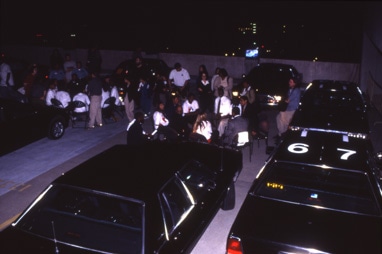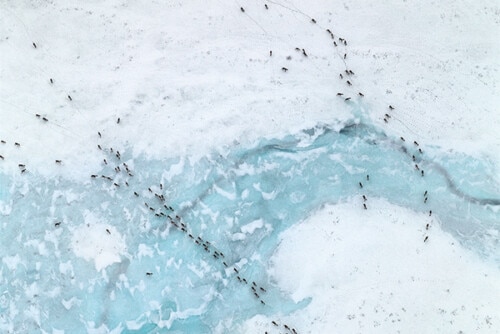Iraq: The Spin and the Lead-Up to War
The Bush administration – and its primary ally, British Prime Minister Tony Blair – spun the case that the Iraqi regime posed such an overwhelming and immediate threat to national and global security that “preemptive self-defense” gave cause for a just war against Saddam Hussein. This doctrine is spelled out in the administration’s policy document, The National Security Strategy of the United States of America, released on September 17, 2002. 1
The primary justifications for a war of preemptive self-defense against Iraq were that Hussein’s regime supported terrorists in general, had links to al Qaeda in particular, and was continuing to develop weapons of mass destruction. 2 As that argument spun out, the administration consistently stated that there was a direct link between Hussein and al Qaeda, implying that, through that link, he was responsible either directly or indirectly for the attacks of September 11, 2001.
The administration sought to soften the image of the invasion by also arguing that it was seeking regime change to free the Iraqi people from decades of despotic rule – to provide them the right to form their own government and use the riches of Iraqi oil to benefit all the people of the country. In particular, the administration used this argument to play to the best side of the American psyche – the belief most Americans share that this country really does stand for freedom and justice and democracy and self-determination for all under all circumstances.
These were the essential elements that the administration used to try to rally both the U.S. Congress and the United Nations for war against the Hussein regime. On September 12, 2002, Bush addressed the United Nations in the push for a new UN resolution requiring the regime to give up weapons of mass destruction and stop support for terrorism in order to avoid war. 3 On October 11, 2002, both houses of the U.S. Congress voted to authorize an attack on Iraq if the regime refused to give up weapons of mass destruction as required by UN resolutions. On November 8, the Security Council unanimously passed Resolution 1441, which established an enhanced inspection regime to disarm Iraq, to be carried out by the UN Monitoring, Verification, and Inspection Commission (UNMOVIC) and the International Atomic Energy Agency (IAEA). 4
Even as the weapons inspectors were resuming their activities, the Bush administration increased rhetorical and real pressure on the Iraqi regime, and began to move troops into the region. Hussein grudgingly began to cooperate with the inspectors, but the Bush administration, under pressure from its primary ally, British prime minister Tony Blair, agreed to press for another UN resolution to grant international legitimacy to the war.
On January 27, 2003, Mohamed ElBaradei, director general of the IAEA, reported to the UN Security Council that, after the first 60 days of the resumed weapons inspections,
We have to date found no evidence that Iraq has revived its nuclear weapons programme since the elimination of the programme in the 1990s. . . . With our verification system now in place, barring exceptional circumstances, and provided there is sustained proactive cooperation by Iraq, we should be able within the next few months to provide credible assurance that Iraq has no nuclear weapons programme. 5
Yet, as if operating in a vacuum, and essentially disregarding ElBaradei’s report, on February 5, 2003, in a dramatic bid to convince a skeptical world of the imminent need for war, Secretary of State Colin Powell presented the Bush administration’s case to the United Nations as a prelude to its push for a second UN resolution for war. 6 In arguing that the Iraqi regime had not abandoned its weapons-of-mass-destruction programs, much of the evidence he presented was based on undisclosed sources, along with documents and intercepts subject to various interpretations. 7 Many of the administration’s claims, presented by Powell, have subsequently unraveled, as described below. While Powell made an eloquent presentation, the evidence he presented did not convince a skeptical world of the need for immediate action. With little support, the United States withdrew its bid for a resolution to endorse its war with Iraq.
On March 17, 2003, in an address to the nation, President Bush gave Hussein an ultimatum: Leave Iraq within 48 hours or face war. Two days later the United States launched its invasion of Iraq with a “decapitation attack” aimed at Hussein and his two sons.
- The White House, National Security Council, The National Security Strategy of the United States of America (September 17, 2002), http://www.whitehouse.gov/nsc/nss.html; see also U.S. Department of Defense, “National Strategy to Combat Weapons of Mass Destruction” (December 2002), http://www.whitehouse.gov/news/releases/2002/12/WMDStrategy.pdf (PDF).[↑]
- As a result of the first Persian Gulf War, through a series of UN resolutions, the regime was required to get rid of its weapons of mass destruction. UN weapons inspections were carried out between 1992 and 1998, when they were suspended.[↑]
- George W. Bush, “Remarks by the President in Address to the United Nations General Assembly” (New York, September 12, 2002), http://www.whitehouse.gov/news/releases/2002/09/20020912-1.html.[↑]
- UN Security Council, Resolution 1441, S/1441 (November 8, 2002), http://www.un.org/Docs/scres/2002/sc2002.htm.[↑]
- Mohamed ElBaradei, “The Status of Nuclear Inspections in Iraq: Statement to the United Nations Security Council” (New York, January 27, 2003), http://www.un.org/News/dh/iraq/elbaradei27jan03.htm.[↑]
- Colin Powell, “Remarks to the United Nations Security Council” (New York, February 5, 2003), http://www.state.gov/secretary/rm/2003/17300.htm.[↑]
- The White House, Press Release, “U.S. Secretary of State Colin Powell Addresses the UN Security Council,” February 5, 2003, http://www.whitehouse.gov/news/releases/2003/02/20030205-1.html. For a point-by-point discussion of the elements of the speech, see the Center for Cooperative Research, “Powell’s Feb. 5th Presentation to the UN,” http://www.cooperativeresearch.org/wot/iraq/colin_powell_february_5_presentation_to_the_un.html.[↑]



